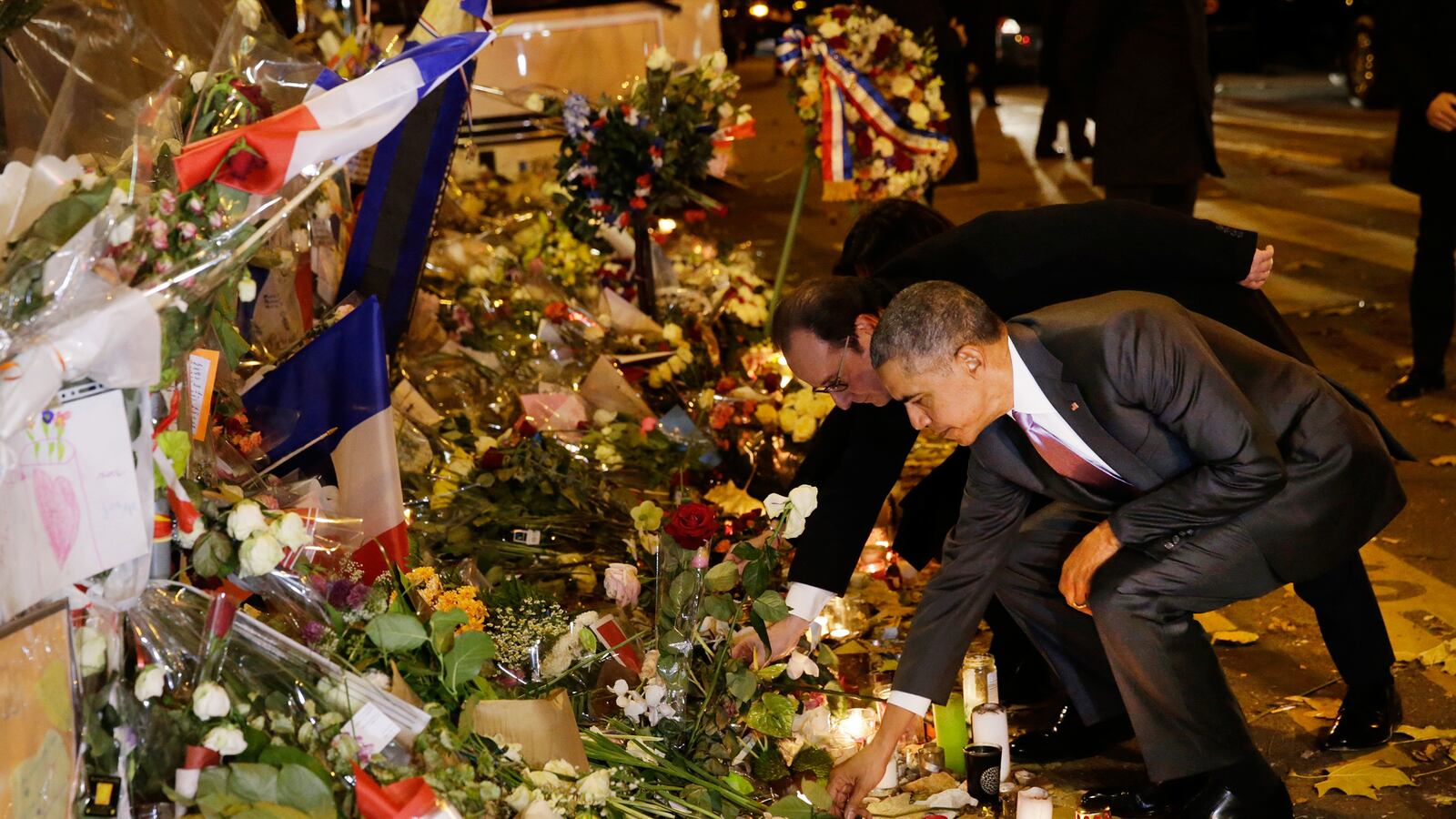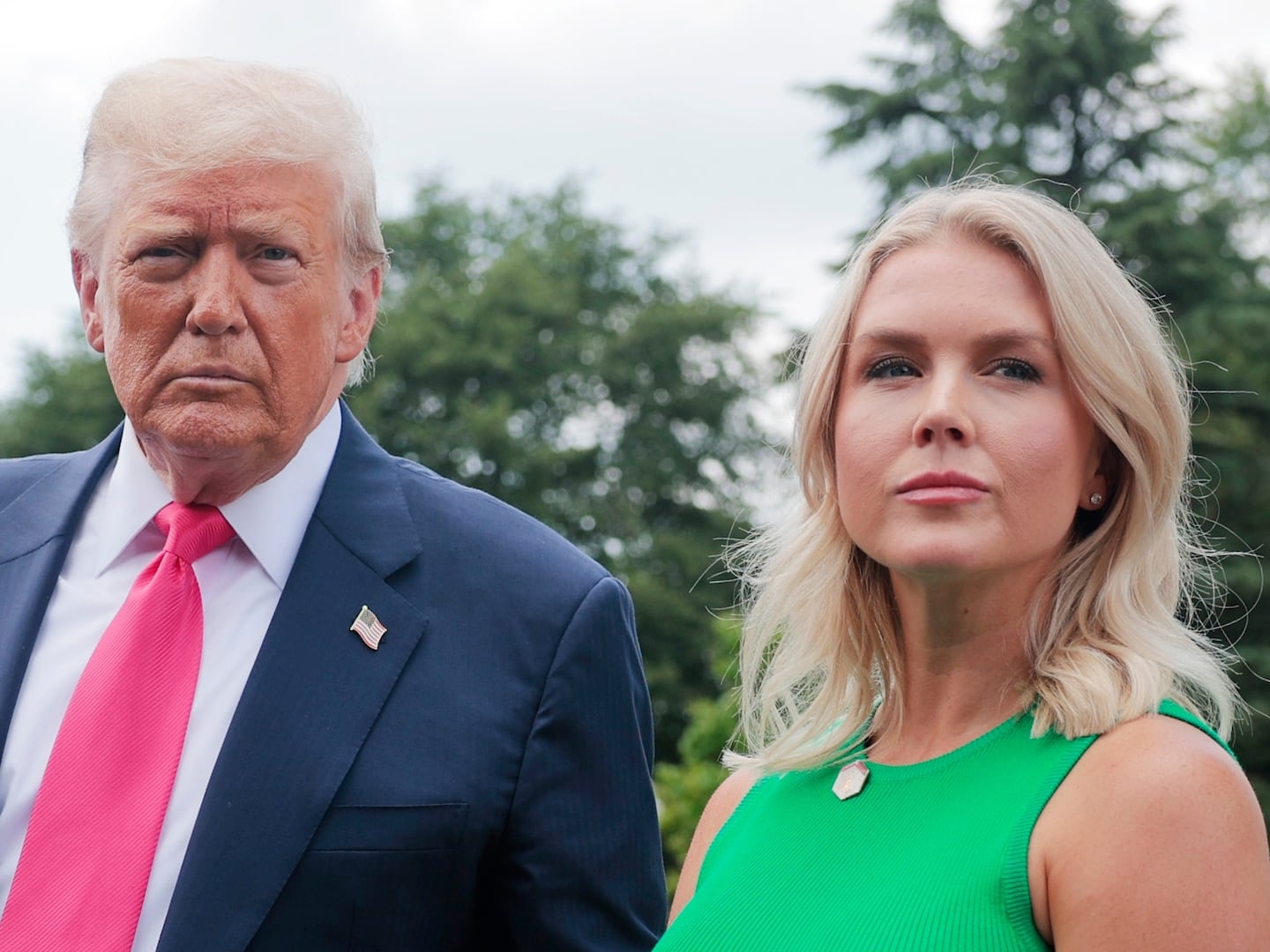PARIS — In the dark early hours of this Monday morning, the presidents of the United States and France stood together with the mayor of Paris on a mostly empty Paris boulevard.
Barack Obama, François Hollande and Mayor Anne Hidalgo each placed a single, simple white rose among the wreaths and flowers and French flags, the photos of victims and the votive candles at the makeshift shrine before the Bataclan concert hall where terrorists murdered 90 of the 130 people they slaughtered in coordinated attacks the night of Friday, Nov. 13. Then the three stood there silently for a long moment beneath the sulfurous streetlights.
So began the American president’s visit to Paris for the United Nations summit on climate change. He had come straight from the airport to pay tribute to those who fell to the terrorists’ guns and bombs. And a few hours later, in his formal speech to the opening session of the meeting attended by 150 heads of state or government, Obama drew a direct connection between the terrorism of today, and the terrible fate that awaits us all if the world does not unite to slow global warming.
“We salute the people of Paris for insisting this crucial conference go on—an act of defiance that proves nothing will deter us from building the future we want for our children,” said Obama. “What greater rejection of those who would tear down our world, than marshaling our best efforts to save it?”
Hollande, too, made the connection between the apocalypse that Paris saw and the apocalypse the world will see if climate change is not brought under control: “I’m not choosing between the fight against terrorism and the fight against global warming,” he said. “These are two major challenges we must overcome. We must leave our children more than a world free of terror, we owe them a planet protected from disasters, a viable livable planet.”
Former U.S. Vice President Al Gore, now here as well, has noted the inconvenient truths about climate change as a security challenge many times. “More than a few top U.S. military leaders have already designated the climate crisis as a national security issue,” he told The Daily Beast back in 2011. “The stability of governance arrangements in many strategically important regions of the world is threatened by the multiple assaults of climate change, as budgets are drained, competition for resources is enhanced, and populations suffer.”
Stepping back from the generalities, it could be argued, fairly, that despite the fears of the present and the anxieties about the future, on its face there is little connection between what happened in Paris on the 13th and the suffering of millions around the world who’ve been affected already by rising temperatures, droughts and sea levels.
To the extent that the killers here have been identified, most grew up in European cities far from the regions in Africa, South Asia, and the Middle East that have suffered catastrophic weather in recent years.
But the Paris terrorists were linked to the so-called Islamic State and its affiliates in an incipient global jihadist insurgency that has managed to seize and hold lands, declaring “caliphates” in spaces that were largely emptied by recent extreme weather and human abuse of natural resources.
Globally, according to UN estimates, climate change is forcing about 20 million people a year out of their homes, and by 2050 that figure could be 150 million. As reported by the Brookings Institution and others, such migrations, whether internal or across borders, create tensions that can turn violent, and in a truly vicious circle that violence can lead to further displacement.
Consider the territories carved out and threatened by the infamous African terror organization Boko Haram. Its fanatics operated in the vicinity of Lake Chad, which has all but disappeared over the last 50 years, shrinking from more than 22,000 square kilometers in the 1960s to fewer than 1,500 today.
As climate patterns shifted, drought set in and attempts to compensate with irrigation drained the lake’s waters. Before anyone had ever heard of Boko Haram, a 2008 report by the UN Environment Program noted, “The changes in the lake have contributed to local lack of water, crop failures, livestock deaths, collapsed fisheries, soil salinity, and increasing poverty throughout the region.”
As the traditional populations moved out, Boko Haram moved in, terrorizing those who stayed behind.
But the most telling case in point is in Iraq and Syria, where the mother of the other “caliphates,” the so-called Islamic State first seized land, then cities, and has used its territory to train and equip a new generation of terrorists, including, precisely, the recruits from France and Belgium who carried out the attacks in Paris.
That region, long known as “the Fertile Crescent,” was laid waste by drought—the worst ever measured—from 2007 to 2010. As Colin P. Kelley and his colleagues point out in a peer-reviewed paper published this year in Proceedings of the National Academy of Sciences of the United States of America (PNAS), man-made climate change is “implicated in the current Syrian conflict.”
The odds for such an extreme drought are “highly unlikely” without factoring in what scientists like to call “anthropogenic” effects that include long-term warming trends in the Eastern Mediterranean and declines in soil moisture, according to this paper.
“The drought exacerbated existing water and agricultural insecurity and caused massive agricultural failures and livestock mortality,” write Kelley et al. “The most significant consequence was the migration of as many as 1.5 million people from rural farming areas to the peripheries of urban centers.”
It is precisely from those populations, uprooted and uncared for, that the group now known as ISIS drew its local recruits and cannon fodder as it rebuilt its ranks and spread its control over territory in the last three years. The core slogan of the Islamic State, “Remain and Expand,” speaks powerfully to people forced off their land and struggling just to survive.
Ironically, among the politicians in the West who deny the impact of climate change and at the same time refuse to accept refugees from war and “economic migrants” from these benighted, blighted lands, the answer to “Remain and Expand” is “stay there and die.”
Whether the summit in Paris this week can turn that kind of thinking around is doubtful, notwithstanding all the good intentions proclaimed here. And partly because of that we can expect many more roses to be laid among the candles, and many more moments of silence to come.






